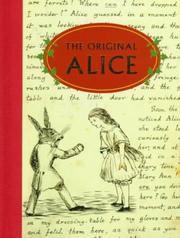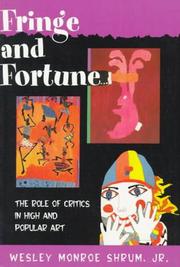| Listing 1 - 4 of 4 |
Sort by
|
Image
Abstract | Keywords | Export | Availability | Bookmark
 Loading...
Loading...Choose an application
- Reference Manager
- EndNote
- RefWorks (Direct export to RefWorks)
Cinemas. --- Film archives. --- Film posters. --- Daisne, Johan, --- Pleasance, Donald, --- Archives.
Book
ISBN: 0340263784 Year: 1982 Publisher: London : Hodder and Stoughton,
Abstract | Keywords | Export | Availability | Bookmark
 Loading...
Loading...Choose an application
- Reference Manager
- EndNote
- RefWorks (Direct export to RefWorks)
Authors, English --- Ecrivains anglais --- Biography --- Biographie --- Carroll, Lewis, --- Hargreaves, Alice Pleasance Liddell, --- Hargrave family --- Liddell family --- Characters --- Alice. --- Great Britain --- Grande-Bretagne --- Biographies

ISBN: 0712345337 Year: 1997 Publisher: London : The British Library,
Abstract | Keywords | Export | Availability | Bookmark
 Loading...
Loading...Choose an application
- Reference Manager
- EndNote
- RefWorks (Direct export to RefWorks)
sprookjes --- Carroll, Lewis --- Tenniel, John --- 820 "18" CARROLL, LEWIS --- 76:655.5 <41> --- 77 CARROLL, LEWIS --- Engelse literatuur--19e eeuw. Periode 1800-1899--CARROLL, LEWIS --- Grafische kunsten. Grafiek. Prentkunst-:-Geïllustreerde boeken (boekillustraties)--Verenigd Koninkrijk van Groot-Brittannië en Noord-Ierland --- Fotografie--CARROLL, LEWIS --- 77 CARROLL, LEWIS Fotografie--CARROLL, LEWIS --- 76:655.5 <41> Grafische kunsten. Grafiek. Prentkunst-:-Geïllustreerde boeken (boekillustraties)--Verenigd Koninkrijk van Groot-Brittannië en Noord-Ierland --- 820 "18" CARROLL, LEWIS Engelse literatuur--19e eeuw. Periode 1800-1899--CARROLL, LEWIS --- verhalen en sprookjes --- Carroll, Lewis. --- Liddell, Alice --- Liddell, Alice, --- Liddell, Alice Pleasance, --- Teniels, Džons, --- Tenniel, D. --- Тенниел, Д. --- ジョン・テニエル, --- Dodgson, Charles Lutwidge --- キャロル ルイス --- verhalen en sprookjes. --- Tenniel, John. --- Kirchner, Ernst Ludwig.

ISBN: 0691026572 0691227632 0691021457 Year: 1996 Publisher: Princeton, N.J. Princeton University Press
Abstract | Keywords | Export | Availability | Bookmark
 Loading...
Loading...Choose an application
- Reference Manager
- EndNote
- RefWorks (Direct export to RefWorks)
Why does the distinction between high and popular art persist in spite of postmodernist predictions that it should vanish? Departing from the conventional view that such distinctions are class-related, Wesley Shrum concentrates instead on the way individuals form opinions about culture through the mediation of critics. He shows that it is the extent to which critics shape the reception of an art form that determines its place in the cultural hierarchy. Those who patronize "lowbrow" art--stand-up comedy, cabaret, movies, and popular music--do not heed critical opinions nearly as much as do those who patronize "highbrow" art--theater, opera, and classical music. Thus the role of critics is crucial to understanding the nature of cultural hierarchy and its persistence. Shrum supports his argument through an inquiry into the performing arts, focusing on the Edinburgh Fringe, the world's largest and most diverse art festival. Beginning with eighteenth-century London playhouses and print media, where performance art criticism flourished, Shrum examines the triangle of mediation involving critics, spectators, and performers. The Fringe is shown to parallel modern art worlds, where choices proliferate along with the demand for guidance. Using interviews with critics and performers, analysis of audiences, and published reviews as well as dramatic vignettes, Shrum reveals the impact of critics on high art forms and explores the "status bargain" in which consumers are influenced by experts in return for prestige.
Art and society --- Art criticism --- Art et société --- Art--Critique --- Class distinction --- Classes [Social ] --- Classes sociales --- Critique d'art --- Culture [Popular ] --- Culture de rue --- Culture des banlieues populaires --- Culture des classes populaires --- Culture des quartiers populaires --- Culture du peuple --- Culture ouvrière --- Culture populaire --- Cultures populaires --- Distinction entre les classes --- Klassen [Sociale ] --- Klassenonderscheid --- Kunst en maatschappij --- Kunst--Kritiek --- Kunstkritiek --- Maatschappij en kunst --- Mass culture --- Pop culture --- Popcultuur --- Populaire cultuur --- Popular arts --- Popular culture --- Rank --- Social classes --- Sociale klassen --- Society and art --- Société et art --- Volkscultuur --- Art and society. --- Art criticism. --- Popular culture. --- Social classes. --- Edinburgh Fringe (Festival) --- Boston Symphony. --- British Broadcasting Corporation (BBC). --- Canadian fringes. --- Daily Telegraph. --- Festival Times. --- Festival of Israel. --- Fringe First awards. --- Fringe. --- Gilded Balloon. --- Holyrood Palace. --- Kant, Immanuel. --- Marquis of Tweeddale. --- Pleasance. --- Scottish nationalism. --- accessibility of art. --- accumulative advantage. --- aestheticians. --- amateur critics. --- amateur performers. --- attendance. --- cabaret. --- centralization. --- classical canon. --- competition. --- cultural capital. --- discourse practices. --- discovery myth. --- discriminating aesthetic. --- diversity. --- editorial bias. --- education. --- egalitarianism. --- entertainment. --- genres. --- heckling. --- hegemony theory. --- iconography of judgment. --- ideology. --- intimacy and space. --- judgment. --- medical revues. --- modality of reviews. --- modern criticism. --- opening date. --- painting. --- performance changes. --- quality claims. --- recommendations. --- reputation. --- revue. --- spectators. --- standards. --- Culture, Popular --- Communication --- Intellectual life --- Mass society --- Recreation --- Culture --- Art --- Art and sociology --- Sociology and art --- Arts --- Criticism --- Classes, Social --- Caste --- Estates (Social orders) --- Social status --- Class consciousness --- Classism --- Social stratification --- Social aspects --- Analysis, interpretation, appreciation --- Edinburgh Festival Fringe --- Fringe (Festival : Edinburgh, Scotland) --- Edinburgh International Festival
| Listing 1 - 4 of 4 |
Sort by
|

 Search
Search Feedback
Feedback About UniCat
About UniCat  Help
Help News
News